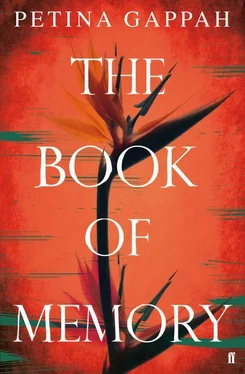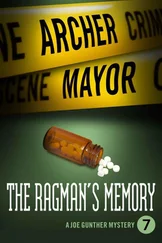I used often to see a small skinny man with gnarled hands, who smoked roll-up cigarettes outside the servants’ quarters while reading Lloyd’s newspaper from the previous day. I assumed that this was Ba’Jethro until Namatai told me that he wasn’t, but did not explain any more.
The first time she saw me, MaiJethro made me stand before her in the kitchen while she assailed me with a thousand questions. Where was I from? What did my father do? Did I have many brothers? How had he died, this brother that was dead? Where was he buried? What did my mother look like? Where was she from? What about my sisters? What were they called? How old were they? Did all my family look like me? Why did I look the way I did? Had I been bewitched? How did Lloyd know my family? Did he give me any money? Where did I keep the money that he gave me? What was my totem? Where was our kumusha ? When was I going back?
I tried to answer, but the questions kept coming.
I burst into tears.
‘Otilda,’ said a voice from the kitchen.
MaiJethro and I looked at the door and found Lloyd, looking stern. He put an arm around me and told me to go to my room. I left them in the kitchen. When I saw MaiJethro again, she looked at me for a long time. I looked back at her without blinking. She never again asked me any questions about my family or how I had come to live with Lloyd, but she looked at me warily, as though I were a dog of whose temper she was not entirely certain.
Namatai was one of the handful of people that I had met who did not do that visible double take on first seeing me. She reminded me of MaiWhizi, back on Mharapara, who talked constantly of other women’s complexions, only Namatai was obsessed with hair — with who had nice hair and who did not. She gave me greasy green ointment that she said was hair food, and she plaited my hair. Unlike my mother’s, Namatai’s hands were not harsh against my scalp.
Both Namatai and MaiJethro had rooms in the servants’ quarters. But more often than not Namatai spent the night in the cottage with Poppy.
Lloyd and Alexandra’s grandmother, Poppy, was the oldest person I had ever seen. She lived in a small cottage on the estate, some way away from the main house. She spent most of her days lying in bed or sitting in her wheelchair on the veranda, looking out at the flowers, trapped in the dementia that had come upon her after her first stroke. In the rare intervals when she was lucid, she asked Namatai to play her jazz records.
When she was young, Poppy had come to the colony as a flapper, with suitcases full of daringly cut drop-waist dresses and strings of beads. Transplanted from the world of London nightclubs to the heat and dust of Rhodesia, and shut out from the currents and fashions of London, Poppy flapped determinedly right to the end, stuck in the jazz age. When I came to live at Summer Madness, I found her still playing the records she must have listened to when she first got off the boat from England.
Her one moment of glory was just a few years after her first grandchild was born, when Louis Armstrong came to play in Salisbury, and the ‘colour bar’, as they called the segregation that separated the races, was for that one evening put aside: both blacks and whites gathered to hear him perform.
With Namatai, MaiJethro and Poppy, I was happy enough, but I never recovered my relationship with Alexandra. I want to believe that she might have been kinder to me if she had known how. She only knew how to command black people or give them her charity. And I was a black child who was only black on the inside.
More than anything, I was relieved that Alexandra and Ian did not live in the valley, but on their farm in Chipinge. They came to town once a month. Alexandra’s marriage to Ian Fleming gave her the improbable name of Alexandra Fleming, which, given her manic dislike of germs, seemed apposite.
Large, florid and moving always in the comingled smells of tobacco and brandy, Ian was a man of many prejudices and little humour. He hated Jews and Greeks and Italians. He hated the Portuguese. He was not too wild about the Irish, either, or the Scots and Welsh, so you can only imagine how he felt about non-whites. His language was coloured by racial otherness. ‘He was drunk as a mine munt on payday’ was one of his favourite expressions, munt being short for muntu , a word that means person in its original, but truncated to munt was as dismissive as his other favourite words for black people: zots and Afs and kafs.
Above all, he hated the new leadership; he had gloomy predictions about what would happen to the country now that the zots had taken over.
His Rhodesia was one of excellence and possibility and he was given to enumerating its successes. He said all of this in my presence, but I was probably invisible to him, and he did not think that I understood anything he said — or if I did, that it did not matter. I was not sophisticated enough to take him on, to point out to him that this Rhodesia had worked only for a few thousand white people.
He also hated people he called ‘poofters’, an all-encompassing category that took in anyone who was not a zot or Jewish or Greek, Portuguese or Italian, Welsh or Scottish, who behaved in any manner that Ian saw as disagreeably different.
It was a category elastic enough to take in Lloyd’s friend Sandy Knight-Bruce, Alan Milhouse, who was a psychiatrist and taught at the university, and anyone else who had the effrontery to act in contravention of how Ian prescribed men should act.
He talked mainly about his macadamia nut estate in Chimanimani, and about the wars that the Flemings and Hendricks had fought in. Between them, the Flemings and the Hendricks had been in every war from the Matabeleland suppression to the First and Second World Wars and the Civil War.
What tied him and Alexandra together was drinking. During their visits, bottles piled up. Looking back, there was something essentially joyless in their drinking, a determination that had nothing to do with conviviality.
Liz Warrender and Sandy Knight-Bruce, the most malicious gossips in Umwinsidale, told me later that Ian had another excitement in his past — a tragedy, even. He had had an affair once, but Alexandra had made him leave the woman and the baby. ‘And I promise you,’ said Liz Warrender, who told me this story, ‘she’s had him by the short-and-curlies ever since.’
Alexandra did not forgive easily. That smashed doll formed the strained basis of my relationship with her. I can connect a straight line from the crack in that doll’s face to her testimony in the witness box at my trial.
She told the judge that I had killed Lloyd for the Hendricks money and for Summer Madness and everything in it. She knew about the will because Lloyd had told her that he would be leaving everything to me. She had not liked it, of course, and had tried in vain to plead with him, and she saw me only as one who sought to take the things the family had fought for and make them my own.
I could never forget that I had ruined her doll, and always I felt that I would say the wrong thing to her. I felt incomplete and inadequate before her cool scrutiny, and so I said as little as I could; for a long time afterwards she thought, as I heard her say to Ian one day, that I seemed ‘slow, somehow retarded’.
This, then, was my new life at Summer Madness, with Lloyd who brought me there, Poppy, MaiJethro and Namatai, and Sandy and Liz and the dogs, and, happily on the periphery, Alexandra and Ian.

When I look back, those early years with Lloyd come to me as a jumble of books, horses and dogs, and a long series of journeys, both actual and imagined, but all real to me. In Mufakose, I moved between my rigidly defined worlds of home and school, my mother’s churches, healers and hospitals.
Читать дальше













